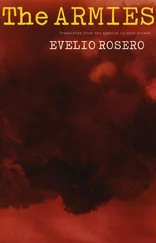“Eleven o’clock at night,” he said, consulting the clock on the consulting room wall, “Innocents’ Day isn’t over yet.”
He seemed genuinely eager to assist, bent over the little table of medical instruments, searching here, searching there; an unassailable force was at work in him which froze his wife and the general, a force that sprang above all from an inspiring serenity. For that reason, lying back on the leather couch, more of a divan than a couch, General Lorenzo Aipe listened drowsily to the medic’s calming voice. The general had his mouth open, lit by a small torch the doctor was holding in his hand. Then the general saw him pick up a tongue depressor and, almost immediately, a syringe; the needle went in, clean and painless. For a moment, the general’s hand seized the doctor’s.
“Steady, General,” Doctor Proceso said. “It’s preferable to anaesthetize the tongue to avoid any pain: we’ll find the fish bone, if there is one.”
“ Is there a fish bone?” Primavera asked, fixing her darkened eyes on her husband.
“It’s the likeliest thing,” he said, without altering his expression. His voice was uninflected, neutral, professional: a medical practitioner carrying out his duty. “That’s what the colouration of the tongue here suggests. I’ll need to palpate it. Patience, General.”
General Lorenzo Aipe wished to speak; he gave a sort of prolonged sigh, and wanted to add something with his hands: signals of astonishment and dissent, incredulity at what he was going through, that well-aimed jab he had been the object of. He started to get up, but the doctor’s hand spread open on his chest and pushed him gently but firmly back onto the couch’s leather pillow.
“General,” he said, “don’t try to speak. At this moment, your tongue is a dead one — like Latin.”
The general and Primavera exchanged another look, full of misgiving, urgently apprehensive. But the doctor’s voice went impassively on and was of a candour that persuaded them.
“Let me do it, General, it won’t hurt, it’s a case of finding the end of the bone, taking hold of it and pulling it out, or breaking it off and destroying it,” and while saying this he already had in his hand, as if by magic, a slender scalpel, like a glinting streak, that he quickly used on who knows which of the seventeen striated muscles of the tongue, as he explained while he did it, “the tongue is a fleshy organ possessing seventeen striated muscles,” he said, concentrating, “that’s done it, general, I’ll apply this little bit of gauze for a few seconds to stop it bleeding, like so, good, the bone has been absorbed into your tongue, from there it’ll dissolve into the intestinal flora and cease to be a danger; it’ll become just like you and me and everyone else: pure shit.”
The horrified silence which followed his words was the decisive push that helped the general to finish getting up, Primavera to finish getting out of the consulting room, the two of them to finish crossing the living room as if fleeing from a lunatic.
The doctor followed them unhurriedly to the front door: he saw how they got into the Volkswagen and left — Primavera at the wheel, the general just a panic-stricken face, goggle-eyed, his hand at his lips.
Afterwards the doctor returned to the living room and sat in the easy chair—“bad job,” he said to himself, “bad job.”
He did not know when Primavera got back. He felt her pass by him, vaguely, like a draught, heard her go upstairs and slam the bedroom door with all her might.
She came back to him much later, by the light of the dawn tinting the windows. He sensed her pass him again, go to the kitchen, head slowly back up the stairs to the first landing: there, Primavera rested her elbows on the handrail.
“And you’re happy,” she said.
The doctor heard her, frozen in his easy chair, but understood absolutely nothing: he was thinking about that episode in Bolívar’s life that Belencito Jojoa had recounted to him one rainy afternoon.
Then he felt her go past again, towards the front door.
“Where are you going?” he said, just for the sake of it, because he thought that was what he ought to ask, or rather, what anyone would ask, and he did not want to disappoint her, he wanted her to leave for wherever she was heading, calmly, at peace.
“The girls,” she snapped, “remember them?”
She clenched her fists. She trembled beside the door.
“You abandoned them to the mercy of those drunks; doesn’t it ever occur to you to worry about your daughters?”
Those drunks are your brothers and sisters, your family , he was on the point of retorting, but contained himself.
“Don’t you ever think that some pervert might just rape them?” Primavera asked, without expecting an answer. “I’m off to the finca , if you really care.”
And then:
“That’s if I’m not too late. And please don’t follow me, don’t even think about it.”
Motionless, he saw her open and close the door and disappear.
He did not know how much time went by, but he was disturbed by the telephone, which dragged him away from Belencito Jojoa telling tales of Bolívar that rainy afternoon, pulled him from his dreams — although not sleeping — in that same easy chair where he was still sitting from the night before. The morning advanced across the windows: now the light hurt his eyes, and yet — he thought, wiping away a tear — for him it was as if the night was still going on. Are my eyes watering because of the brightness of the light or because I’m crying? The telephone persisted, beside him. He stretched out an arm and answered it. Even before putting the receiver to his ear he heard a voice that sounded like it was coming from the other side of a storm. Not only did the interfering noise resemble that of a storm, but the quiet voice itself could be heard breaking up into crackling sounds. It was the voice of General Lorenzo Aipe, or rather, a sort of guttural groaning he was making — more words, fewer words, and always fragmented:
“Doctor, if I’m damaged for life, you’re dead, do you hear me, you sonofabitch doctor? You’re dead if you injured my tongue.”
Doctor Proceso let the morning advance over him, let the sun touch the edge of his shoes, his knees, his waist, his chest, and on up to his eyes. He had resolved to go out to the finca after Primavera, for his daughters — but no, he said to himself. “No,” he repeated out loud, “I won’t go.”
He would visit the sculptor Cangrejito Arbeláez, as agreed with the maestros: renew his enthusiasm for Bolívar’s carriage. From that moment on, his pain of a love for Primavera, that absurd uncertainty of love, would be left behind. From now on he would think only of himself and the float, with no backing down, unlike what he had been permitted his entire life, his whole life condemned to the suffering caused by a single name: Primavera.
But when he crossed Pasto’s sleeping streets in his jeep, that Thursday, December 29, 1966, he was still remembering the scalpel that had seemed to have had a life of its own, the pink and white tongue, Primavera’s astonished eyes, the blood, General Aipe’s tortured voice threatening him.
“Bad job,” he said to himself again. “Very bad job.”
Without yet having exchanged a word with the doctor about the float, the sculptor Cangrejito Arbeláez had already chiselled reliefs of the early events of Bolívar’s life onto wooden panels. At that moment, he was marking out the betrayal of Miranda, and Doctor Proceso was observing, fascinated, the gradual appearance of Simón Bolívar and the other conspirators, beneath the rapid chisel blows, Bolívar with Miranda’s sword and pistol — Miranda who waited, sitting up in bed, hands and feet in chains — the Spanish soldiers approaching and, underneath, running the full length of the panel, in carved lettering: SIMÓN BOLÍVAR BETRAYS HIS GENERAL, FRANCISCO DE MIRANDA .
Читать дальше












